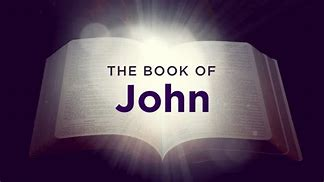The Death of Jesus - {Interlinear <Greek>}
19:28 - After {Μετὰ <meta>} this, {τοῦτο <houtos>} Jesus, {ὁ Ἰησοῦς <ho Iēsous>} knowing {εἰδὼς <oida>} that {ὅτι <hoti>} all {πάντα <pas>} was → now {ἤδη <ēdē>} finished, {τετέλεσται, <teleō>} said {λέγει· <egō>} (to {ἵνα <hina>} fulfill {τελειωθῇ <teleioō>} the {ἡ <ho>} Scripture), {γραφή, <graphē>} “I → thirst.” {διψῶ.<dipsaō>}
19:29 - A → jar {σκεῦος <skeuos>} full {μεστόν. <mestos>} of sour wine {ὄξους <oxos>} stood {ἔκειτο <keimai>} there, ← so {οὖν <oun>} they → put {περιθέντες <peritithēmi>} a → sponge {σπόγγον <spongos>} full {μεστὸν <mestos>} of → the {τοῦ <ho>} sour wine {ὄξους <oxos>} on → a → hyssop {ὑσσώπῳ <hyssōpos>} branch ← and • held → it • to {προσήνεγκαν <prospherō>} his {αὐτοῦ <autos>} mouth. {τῷ <στόματι. <ho stoma>}
19:30 - When {ὅτε <hote>} • {οὖν <oun>} Jesus {ὁ Ἰησοῦς <ho Iēsous>} had → received {ἔλαβεν <lambanō>} the {τὸ <ho>} sour wine, {ὄξος <oxos>} he → said, {εἶπεν· <legō>} “It → is → finished,” {τετέλεσται. <teleō>} and {καὶ <kai>} he → bowed {κλείνας <klinō>} his • head {τὴν κεφαλὴν <ho kephalē>} and • gave up {παρέδωκεν paradidōmi>} his • spirit. {τὸ πνεῦμα. <ho pneuma>}
19:31 - • {οὖν <oun>} Since {ἐπεὶ <epei>} it → was {ἦν, <eimi>} the → day → of → Preparation, {παρασκευὴ <paraskeuē>} and • so that {ἵνα <hina>} the {τὰ <ho>} bodies {σώματα <sōma>} would → not {μὴ <mē>} remain {μείνῃ <menō>} on {ἐπὶ <epi>} the {τοῦ <ho>} cross {σταυροῦ <stauros>} on {ἐν <en>} the {τῷ <ho>} Sabbath {σαββάτῳ, <sabbaton>} (for {γὰρ <gar>} that {ἐκείνου <ekeinos>} Sabbath {τοῦ σαββάτου, <ho sabbaton>} was {ἦν <eimi>} a → high {μεγάλη <megas>} day), {ἡ ἡμέρα <ho hēmera>} the {Οἱ <ho>} Jews {Ἰουδαῖοι, <Ioudaios>} asked {ἠρώτησαν <erōtaō>} Pilate {τὸν Πειλᾶτον <ho Pilatos>} that {ἵνα <hina>} their {αὐτῶν <autos>} legs {τὰ σκέλη <ho skelos>} might → be → broken {κατεαγῶσιν <katagnymi>} and {καὶ <kai>} that • they might be taken away. {ἀρθῶσιν. <airō>}
19:32 - So {οὖν <oun>} the {οἱ <ho>} soldiers {στρατιῶται <stratiōtēs>} came {ἦλθον <erchomai>} and {καὶ <kai>} • {μὲν <men>} broke {κατέαξαν <katagnymi>| the {τὰ <ho>} legs {σκέλη <skelos>} of → the {τοῦ <ho>} first, {πρώτου <prōtos>} and {καὶ <kai>} of → the {τοῦ <ho>} other {ἄλλου <allos>} who {τοῦ <ho>} had been crucified with {συνσταυρωθέντος <synstauroō>} him. {αὐτῷ. <autos>}
19:33 - But {δὲ <de>} when → they → came {ἐλθόντες, <erchomai>} to {ἐπὶ <epi>} Jesus {τὸν Ἰησοῦν <ho Iēsous>} and {ὡς <hōs>} saw {εἶδον <horaō>} that • he {αὐτὸν <autos>} was → already {ἤδη <ēdē>} dead, {τεθνηκότα, <thnēskō>} they → did → not {οὐ <ou>} break {κατέαξαν <katagnymi>} his {αὐτοῦ <autos>} legs. {τὰ σκέλη, <ho skelos>}
19:34 - But {ἀλλ᾽ <alla>} one {εἷς <heis>} of → the {τῶν <ho>} soldiers {στρατιωτῶν <stratiōtēs>} pierced {ἔνυξεν, <nyssō>} his {αὐτοῦ <autos>} side {τὴν πλευρὰν <ho pleura>} with → a → spear, {λόγχῃ <lonchē>} and {καὶ <kai>} at once {εὐθὺς <euthys>} there • came out {ἐξῆλθεν <exerchomai>} blood {αἷμα <haima>} and {καὶ <kai>} water. {ὕδωρ. <hydōr>}
19:35 - • {καὶ <kai>} He who {ὁ <ho>} saw {ἑωρακὼς <horaō>} it • has → borne → witness— {μεμαρτύρηκεν <martyreō>} • {καὶ <kai>} his {αὐτοῦ <autos>} testimony {ἡ μαρτυρία <ho martyria>} is {ἐστιν <eimi>} true, {ἀληθινὴ <alēthinos>} and {καὶ <kai>} he {ἐκεῖνος <ekeinos>} knows {οἶδεν <oida>} that {ὅτι <hoti>} he → is → telling {λέγει, <legō>} the → truth— {ἀληθῆ <alēthēs>} that {ἵνα <hina>} you {ὑμεῖς <sy>} also {καὶ <kai>} may → believe. {πιστεύητε. <pisteuō>}
19:36 - For {γὰρ <gar>} these {ταῦτα <houtos>} things ← took place {ἐγένετο <ginomai>} that {ἵνα <hina>} the {ἡ <ho>} Scripture {γραφὴ <graphē>} might → be → fulfilled: {πληρωθῇ· <plēroō>} “Not {οὐ <ou>} one • of • his {αὐτοῦ. <autos>} bones {ὀστοῦν <osteon>} will → be → broken.” {συντριβήσεται <syntribō>}
19:37 - And {καὶ <kai>} again {πάλιν <palin>} another {ἑτέρα <heteros>} Scripture {γραφὴ <graphē>} says, {λέγει· <legō>} “They → will → look {ὄψονται <horaō>} on {εἰς <eis>} him → whom {ὃν <hos>} they → have → pierced.” {ἐξεκέντησαν. <ekkenteō>}

Along with the sovereignty and compassion of Jesus, John makes the substitutionary atonement of Jesus unambiguously central in his narration of the passion. Jesus didn’t just take Barabbas’s place on the cross (18:40), he substituted himself for all those he came to save.
Jesus’ thirst (19:28) was the thirst of the Messiah, anticipated in Psalm 22:15–18. But it was also our thirst. Jesus became thirsty for us so that we would never thirst again (cf. John 4:14). His bones remained unbroken because Jesus died as the Passover Lamb (Ex. 12.46; Num. 9:12). Jesus wasn’t just crucified between criminals, but for criminals as a criminal. God “made him to be sin who knew no sin, so that in him we might become the righteousness of God” (2 Cor. 5:21).
Because Jesus cried, “It is finished,” and gave up his spirit, we now shout, “Hallelujah!” and receive his Spirit. Everything promised—everything needful for our redemption and for the coming “new world” (Matt. 19:28), was accomplished. Nothing was left undone.
Jesus’ garments were not torn, because, unlike the first Israel, his kingdom will never be divided (1 Kings 11:29–31). “The kingdom of the world has become the kingdom of our Lord and of his Christ, and he shall reign forever and ever” (Rev. 11:15).
References:
All contents are reposted from ESV.org.
“Scripture quotations are from The ESV® Bible (The Holy Bible, English Standard Version®), copyright © 2001 by Crossway, a publishing ministry of Good News Publishers. Used by permission.
All rights reserved.”
Commentaires